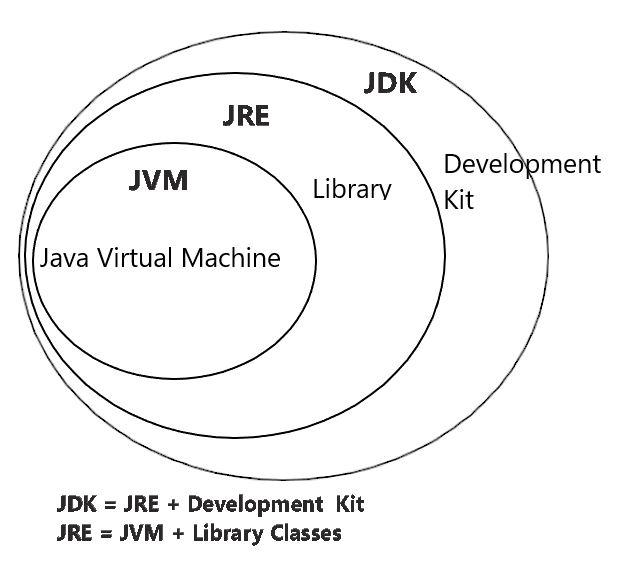We need two different platforms ready to use java those are hardware platform and software platform. Java JDK/JRE is a software which can be installed on top of Hardware platform. Which are physically exists those are called as Hardware like Computer. By using these two platforms we can run any applications.
Java is platform independent that means once we compile java program and generates a class file, we can execute that class file on top of any other environment(Linux, Unix,Mac..etc) and we can get the same results. To understand about Java architecture or internal process of program compilation and execution, we should understand about JVM (Java Virtual Memory), JRE (Java Runtime Environment) and JDK (Java Development Kit). To understand more of JVM, JRE and JDK, have a look at this article.
As on when we have created java program and compiled it by using Java compiler, the compiler will generate the .class file which contains the byte code of ,java file. Compilation will fail, if compiler will find any errors/exceptions in .java file. To compile a java file and execute we need JVM, JRE and JDK ready to use. That means we should have downloaded the required JDK software and done proper path/classpath setup.
As I already mentioned, JVM, JRE and JDK runs on top of the Hardware platform. The java file compiled and executed on top of JVM, JRE and JDK. If we have compiled a java file and generated class file using Windows environment, that class file we can execute on top of any other environment like Linux, Unix, Mac... etc. This is also called as Platform independent and WORA (Write Once Run Anywhere).
To compile java file, java provides a command called javac (Java Compiler). Javac can convert our source code into byte code and place it in a class file. Java byte code is platform independent version of machine code. After generating the .class file, we can invoke JVM to execute the byte code by using the command called java.
Platform Independent:
As of I got questions from people, how will you prove Java is platform independent? Then I have explained them, Yes, Java is platform independent. Because, We can write java code only once and we can execute compiled class file in any environment and get the same result what we get the actual environment of code implemented. In simple words, Write Once Run Anywhere(WORA).
As representing in the above diagram, Java is platform independent. First we have created the Java program and compile in any of the environment which will generate the .class file. We can execute that class file in any other environments like Linux, Windows, Unix...etc. So, this process confirms that Java is platform independent.
Out of JVM, JRE and JDK which is platform independent?
None. JVM, JRE and JDK all are platform dependent only.
How many JVM's create internally?
No limit. It's completely depending up on Hardware platform of using.
Java is platform independent that means once we compile java program and generates a class file, we can execute that class file on top of any other environment(Linux, Unix,Mac..etc) and we can get the same results. To understand about Java architecture or internal process of program compilation and execution, we should understand about JVM (Java Virtual Memory), JRE (Java Runtime Environment) and JDK (Java Development Kit). To understand more of JVM, JRE and JDK, have a look at this article.
As on when we have created java program and compiled it by using Java compiler, the compiler will generate the .class file which contains the byte code of ,java file. Compilation will fail, if compiler will find any errors/exceptions in .java file. To compile a java file and execute we need JVM, JRE and JDK ready to use. That means we should have downloaded the required JDK software and done proper path/classpath setup.

As I already mentioned, JVM, JRE and JDK runs on top of the Hardware platform. The java file compiled and executed on top of JVM, JRE and JDK. If we have compiled a java file and generated class file using Windows environment, that class file we can execute on top of any other environment like Linux, Unix, Mac... etc. This is also called as Platform independent and WORA (Write Once Run Anywhere).
To compile java file, java provides a command called javac (Java Compiler). Javac can convert our source code into byte code and place it in a class file. Java byte code is platform independent version of machine code. After generating the .class file, we can invoke JVM to execute the byte code by using the command called java.
Platform Independent:
As of I got questions from people, how will you prove Java is platform independent? Then I have explained them, Yes, Java is platform independent. Because, We can write java code only once and we can execute compiled class file in any environment and get the same result what we get the actual environment of code implemented. In simple words, Write Once Run Anywhere(WORA).
As representing in the above diagram, Java is platform independent. First we have created the Java program and compile in any of the environment which will generate the .class file. We can execute that class file in any other environments like Linux, Windows, Unix...etc. So, this process confirms that Java is platform independent.
Out of JVM, JRE and JDK which is platform independent?
None. JVM, JRE and JDK all are platform dependent only.
How many JVM's create internally?
No limit. It's completely depending up on Hardware platform of using.

Comments
Post a Comment